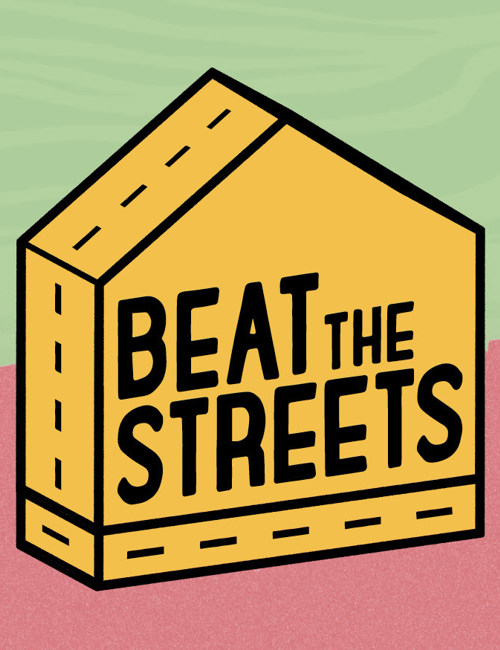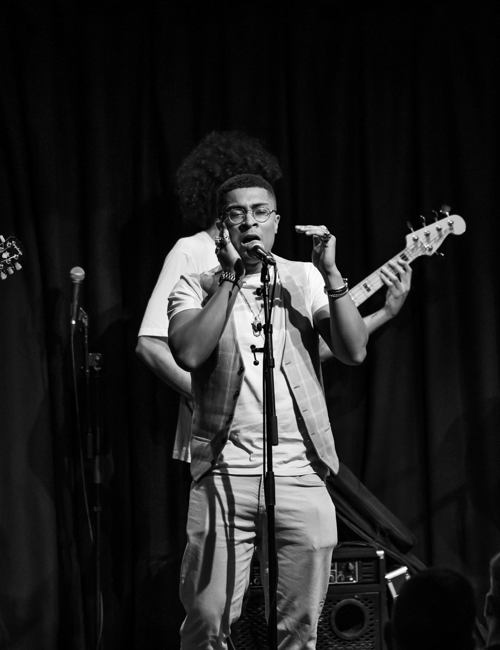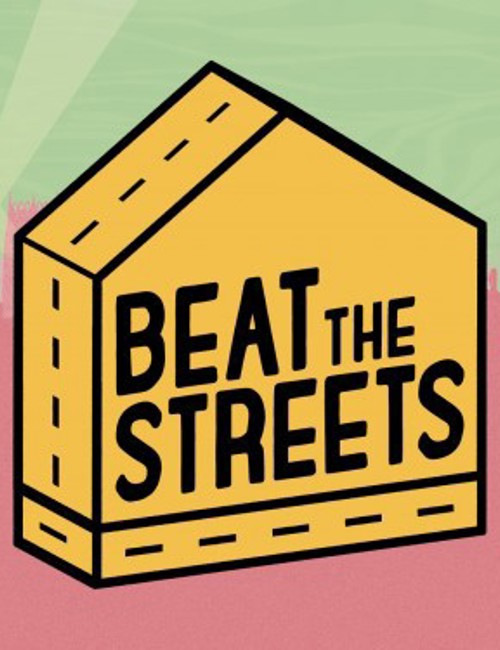
Photo: Leigh Beard
The Tories are back in power and a lot of your peers are making dour punk records about poverty and failure. Zoetrope is the opposite of that - it’s colourful and hopeful. Was that deliberate? Is this your Giorgio Moroder ft Donna Summers record for the difficult times we’re living in?
I worked out years ago that if I’m depressed and I try to express how bad I feel in a song it just makes me feel worse, so I started writing music that cheered me up. I love joyous music and I love art that expresses joy. A lot of the time there’s this really strange assumption that art that explores negative emotions, such as depression, is more valid somehow and I really don’t like that. That’s why I enjoy exploring positivity in music. That said, these are shit times and I do spend a lot of time worrying about that so when it came to writing the lyrics for the record they ended up being about how shit it is working a job. Writing a positive melody seems like a good way of cheering yourself up, but writing a positive lyric just felt like a lie.
So basically the more joyous the music on the record the more down you were when you wrote it?
Pretty much. as well as listening to music, writing music is escapism. My job can be quite stressful so it’s a crucial way for me to unwind. Making music is an incredibly healthy activity and a good way of coming to terms with stuff. Alcohol is a less good way and I try to juggle those two things. Rather than just sit at home and drink a bottle of wine, I’ll try and write some music.
There’s a filmic quality to the record. It reminds me of that Polanski film Frantic. Has cinema informed your writing at all?
I don’t think it has, although I do really like soundtrack music and I’ve made instrumental music for a long time, so I suppose film soundtracks along with all other forms of popular instrumental music like video game music or whatever have been inspirational. That said, I don’t tend to think visually when I write. Funnily enough, half my degree was in film and my relationship with cinema has never recovered (laughs). I watch way fewer films now than before I went to university.
The record has an almost pan-European quality to it…
It’s wasn’t a conscious decision. I really like music that has a regional or national identity. Obviously Sleaford Mods have that really distinct East Midlands identity. A lot of my favourite bands are very much of a time and a place and expressing a feeling about the culture of that time. I’d like to make music like that but it just doesn’t come out of me naturally. I’ve never really managed to find a distinctive British voice or anything like that.
One of the big departures for Cantaloupe was the inclusion of vocalists on this record…
I wanted to be a singer when I was fifteen, like most people, and then I tried it and found I wasn’t very comfortable with it. I ended up in instrumental bands by accident rather than design - I would be lying if I said that I intended to make predominantly instrumental music in the last two bands I’ve been in - but I found I really enjoyed it. I like exploring stuff instrumentally, but over the last few years I’ve increasingly wanted to go back to doing something with lyrics and vocals.
Do you write the vocal lines?
We now have two vocalists: Eleanor, and Tom who’s based in London. With Eleanor it was very collaborative because she’s quite local so we would meet up and exchange ideas. With Tom it was totally different in that we sent him a finished track and he sent it back to us with the finished vocal on it, which really blew me away.
Is there anyone who you’d like to work with vocally?
I’d really like to work with vocalists who don’t usually work in electronic music, someone like Will Oldham or Bill Callahan would be totally amazing, or maybe David Thomas Broughton or Richard Dawson. Hopefully more people will hear this record than our previous records and might think, “I’d like to sing on that” and it’ll open some doors.
Could you have made this record fifteen years ago?
Not a chance. We couldn’t have made it five years ago. We couldn’t have made it without Dropbox! We wrote it all remotely. I’d demo some ideas for a track often to a drumbeat that Aaron (drummer) would send me, which he’d recorded in the comfort of his flat. I’d then come up with some ideas and a rough song structure and send that back to Aaron and Dave (guitarist) and they’d overdub more parts at home.

Photo: Leigh Beard
Was that out of necessity because you live in different parts of the country?
Yeah, there was no other way. I was pretty nervous when Aaron and Dave announced pretty closely after each other that they were moving away, I thought I’d lost my band but it ended up working way better than I thought it would.
What zoetrope animation do you think would sum up Cantaloupe?
It would be a loop of going to work but with the full gamut of going to work emotions from “I’m really excited about this day” to “I really don’t want to do this day.” In your thirties the list of possibilities seems to ebb away and you find yourself in a more and more circular existence just going about doing what you do. When you’re young, you hopefully have boundless optimism, you’re aware of all these possibilities and you have all these ambitions. Then in your twenties you embrace an existence of working in a shitty temp job: you make enough to pay the bills, go out to as many gigs as possible, spend as much time making music as you want, spend as much time drinking and seeing friends as you want and go to work with a hangover the next day, but just about being able to cope because you’re still young.
As time marches on you start thinking, “Maybe I should get a more secure job, maybe I should settle down with this great person I’ve met.” All these wonderful things come out of that, but one thing that is really noticeable is that things become more based on routine. I love and hate that routine. It’s amazing to have my own house and my wife and my cat. The aspect of it I find really tricky is that the amount of things that are possible, that list has shrunk quite a lot. You can no longer be like “I’m having a really good time with my friend, I’ve just had my third pint, I’m just going to go for it.” That idea just doesn’t happen and the zoetrope idea is about that. It’s specifically about life being cyclical and feeling quite trapped, and the escape from that being the magical aspect of music that takes you off to other places. I love the fact that the zoetrope is cyclical. It does the same thing again and again but it’s also magical. That’s where it came from.
There’s a track on the album called Ian Whitehead. Who is Ian Whitehead?
A very beautiful man. He was the bassist in our old band Souvaris, which Dave, Aaron and I played in for thirteen years. We absolutely love Ian. He’s a wonderful man; he’s a great eccentric and just a pure soul. When we used to write songs in Souvaris I would often write quite upbeat riffs and he would reject them for being too ‘breezy’. “It’s just too breezy” that was always his phrase. When I wrote the riff for Ian Whitehead I thought, “that is really fucking breezy” so it’s an affectionate tribute to Ian - and we also knew it would slightly annoy him.
It’s a very idiosyncratic sounding record which doesn’t really sound like anything else at the moment. What influences would you say informed it?
A lot of disco and New York boogie. I love that stuff. I love the economy of the arrangements, also Stereolab and Broadcast, a lot of Krautrock, Harmonia and Neu! Stuff like the Human League, Talking Heads, OMD, eighties pop. You listen to music that excites you and you want to make music that excites you so inevitably there’s going to be a certain amount of confluence there.
Laurie Anderson did a concert for dogs in Australia. I personally think this album would sound good to dogs. Have you tested it?
I haven’t but it’s a constant discussion in our house. We both really want one but are worried about the responsibility, as we’re both at work. It would be lovely to test it on a dog.
You’re a former employee of the Thompson Bros. Have they heard the record yet?
I’ve sent them a copy. I did consider pitching it to LeftLion that they do the review. It’ll probably be three months before they get round to hearing it, though.
.jpg)
Photo: Leigh Beard
Having made music independently for the past fifteen years, what are some of the big changes you’ve noticed over that time?
There are three big ones. Myself and most of my friends find making music increasingly hard, and by that I don’t mean the writing of the songs or the desire to do it, I mean the getting out there, finding shows, finding the time to do it, finding the right platform. There are a few different factors that affect me. One is “I’m getting old” - I’m 33, I’m a teacher, I have to be in bed by 10:30pm ideally. I’ve got a lot of work on and that obviously makes making music harder. The other aspect is the relentless promotional stuff you have to do on Twitter and Facebook to keep on people’s radars and your head above water. You’ve got to have something to sell, something to tweet about, and something to say constantly. The amount of work that is completely extracurricular and separate from the actual act of writing a song and playing a show these days has exploded. I think people of my age often think “Jesus, why have I got to tweet about this?!” The last thing is a general atmosphere in the country now among left-leaning adults that is pretty miserable. Working in the public sector is pretty miserable. So all of those things combine to create this ‘struggle’ and I don’t know the dominant factor affecting things or whether I’m lumping things together unnecessarily.
It strikes me now more than ever that if you’re not young and middle class then you’re a bit screwed. Do you feel you’ll be able to strike the work-life balance to get your music out there?
This is the first record I’ve made where I’ve thought, “This might appeal to someone, this could get played on the radio and maybe more than forty people might want to see us play live at a time.” I am quite ambitious in that sense. I’d like to play to bigger audiences, I’d like to travel a bit further and get radio play because I like the songs and I want people to hear them, so I’m willing to promote this record much harder than I’ve done before. This is the first time I’ve thought about being really proactive. That Twitter account I made three years ago, I’m going to use it (laughs). We’re going to get some actual press shots done rather than using a photo of the four of us pissed outside a venue at two in the morning. Now I’m doing it properly, that’s two to three hours a day! Then when you tie that into having a job, where the fuck do you find time to write a song? What I’m saying is everything is radically different to what it was ten years ago. I’m totally unsold that it’s better or worse. It’s more egalitarian in that it’s easier to access but it’s more labour intensive.
Do you feel that people care less about music because it’s easier to access? Is it easier for people to dispose of music far quicker because of the ease of hearing it now?
I’ve certainly noticed it with the students that I teach. The way they access music is incredibly fast and I think that part of it is that they’re able to pass on things much quicker than we could. Their brains are really good at multi-tasking. They can pick something apart way quicker than we could but part of it is to skip over it, give it thirty seconds and skip forward. I had a student a couple of years ago who was getting into a lot of the music I like, so I did that dreadfully corny thing of saying “Hey, let’s talk about music, you should check this record out” and he asked me about post-rock and he said he’d heard of Mogwai so I suggested a few bands that I thought he’d like. The next day he said, “I listened to that band you recommended, quite liked them, I listened to them too, all three albums, they were alright, listened to that band, they were amazing and that band were shit.” He’d evaluated fifteen years of post-rock overnight. Then he said “I’ve heard Krautrock’s pretty interesting, what can you tell me about that?”
How would you explain 0891 50 50 50 to a student who is not old enough to remember the chat line advert?
The thing I really like about that song is that everyone of a certain age gets the reference. The guys from Zun Zun Egui stayed over so I gave them a copy of the record and one of them was reading the track listing and he said “0891 50 50 50? I can hear someone shouting the fifties. Was that a late night TV advert?” I don’t know how I’d explain that to my students. Do you have chat lines these days? It’s all web now right?
That track was probably the most directly influenced by anything on the record. I really love a guy called Patrick Cowley - he did all the production and arrangement for Sylvester - an artist from the New York gay scene in the late seventies/early eighties who was a pioneer of electronic music. I just love the records that he made, they’re a really outward celebration of the culture of that time. Also Frankie Goes to Hollywood, Welcome to the Pleasure Dome, I was listening to that a lot too. 0891 50 50 50 is basically a direct celebration of that kind of music which was just really euphoric and really exciting, and it’s a celebration of that time and place. It’s the gayest thing I could write as a straight man.
What’s the worst gig you’ve played with Cantaloupe?
We played in Montpellier in France and we were playing increasingly shit shows and things were starting to get us down so we were really hoping that this one show might lift our spirits. We ended up playing to five people in this bar, but three of them walked out thirty seconds into the first song so we actually just played to my sister-in-law and her friend. Afterwards we went to stay in this guy’s house and it was this little flat that was like something from Trainspotting. It was disgusting. He just had a bed and a TV and on the wall there was a silhouette of his sweat where he sat against the wall watching the TV. I woke up in the middle of the night having a panic attack and all I could think was “Where the hell am I? I feel so filthy”, so I went to the bathroom to try and calm myself down. I opened the bathroom cupboard and the only thing that was in the bathroom cupboard was beard hair. Beard hair on every shelf. We all woke up at 7am and I stuck my head through the guy’s bedroom door and whispered, “we’re going now”. He was in this squalid bed with an overflowing ashtray the size of a plate right next to his head and on the other side of his head was a really massive bottle of squeezy Heinz salad cream. I discovered that night that I can handle a shit show but I can’t handle filthy accommodation.
Are you hoping to play any festivals?
We’re trying but I don’t know how you do that. I feel like to get on those line-ups you almost have to be in this free Masonic club: you’ve got to know the right handshake and then I realised that knowing the right handshake is having loads of money and paying someone to be a festival pimper and knowing the right people.
What is the laziest comparison you’ve heard from a hack trying to describe Cantaloupe?
Daft Punk. I do like Daft Punk but I think it’s an easy reference point from anyone who doesn’t know much about electronic music. One we get a lot is ‘retro-futurist’ and I don’t really know what that means. Well I’ve got an inkling of what that means but it’s not how I think about how I want to make music. I don’t think “Hey, I want to make old music that sounds like new music.”
Zoetrope, the debut album from Cantaloupe, is out now via Hello Thor.
Cantaloupe album launch with support from Galaxians and Blunt Mountains, The Chameleon, Saturday 18 April 2015
Cantaloupe website
We have a favour to ask
LeftLion is Nottingham’s meeting point for information about what’s going on in our city, from the established organisations to the grassroots. We want to keep what we do free to all to access, but increasingly we are relying on revenue from our readers to continue. Can you spare a few quid each month to support us?




